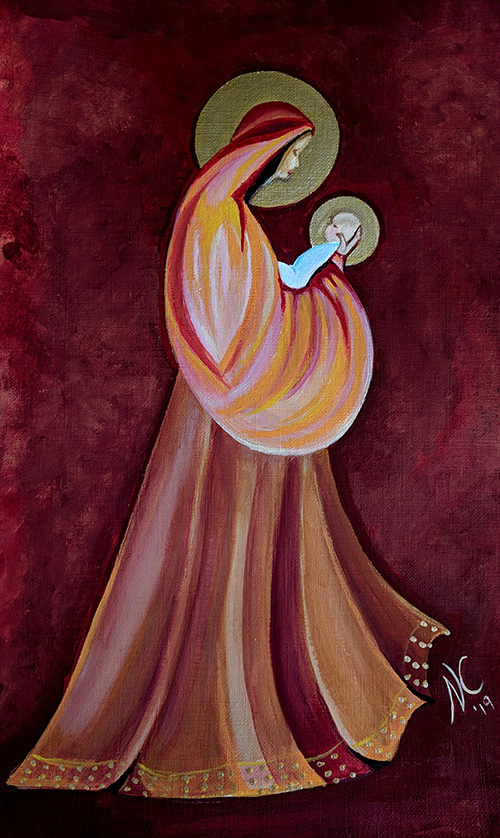By Archbishop Thomas Wenski - The Archdiocese of Miami
We are interested in knowing who we are and where we come from. Thus, in recent years, due to advances in genetics and the wide availability of DNA testing, genealogies have become popular again. Many families are discovering their family trees thanks to DNA tests and companies like Ancestry.Com. The PBS series starring Henry Louis Gates, “Finding your roots,” painstakingly examines archives of public records in order to give celebrities new insights into their pasts – and entertains us while doing it.
Matthew’s Gospel begins with a genealogy of Jesus. The older Douay-Rheims translation gives us a series of “begots” beginning with Abraham who “begot” Isaac and ending some 16 verses later with Jacob who “begot” Joseph, “the husband of Mary, of whom was born Jesus, who is called Christ.”

Photographer: Noris Capin
Parkland-based artist Noris Capin's painting, Virgin and Child, graces this month's front page of the Florida Catholic, as a reminder that "The Word became flesh, he lived among us, and we saw his glory..." (John 1:14)
DNA testing wasn’t available to Matthew – but since Matthew is establishing Jesus’ “family tree” through Joseph, a DNA test would not have been helpful since Jesus was born of a Virgin “who did not know man.”
Nevertheless, in a very concrete yet poetic way, Matthew gives us Jesus’ family tree. This presentation of Jesus’ family tree gives a kind of telescopic view of God’s redemptive work that would culminate in the birth of the Word made Flesh.
Jesus’ family tree – no doubt like our own – has quite a few secrets and surprises. Even a passing familiarity with Jesus’ ancestors remind us that life can be messy. Look at King David, just to cite one of Jesus’ ancestors: He was the slayer of Goliath, a great king, the recipient of a great promise from God but he also was an adulterer and a murderer. Perhaps it is no wonder that Jesus could feel “at home” with sinners and tax collectors. Matthew does not “airbrush” anybody out of the picture of Jesus’ ancestry. Jesus’ family tree, like our own, is a mix of holy and unholy characters, or characters that are sometimes holy and, sometimes, not so much.
Matthew’s listing of Jesus’ genealogy might seem to some boring, but it does remind us that our Christian faith is not about an idea, an ideology, or a philosophy; our Christian faith is not merely a moral code we bind ourselves to; our Christian faith is about an event that occurred in time and space, our Christian faith is about an encounter, an encounter with a person, Jesus Christ.
This event affects our entire lives – and fully transforms them. At Christmas, we too find our “roots” and discover who we are, where we came from – and more importantly, where we are going. This encounter with Jesus Christ, of course, demands from us a response – it is a response that is given in faith at baptism and lived out in friendship with Jesus Christ.
Our Christmases can be “bittersweet” as was that first Christmas when Christ was born in a stable because there was no room for him in the inn. Nevertheless, the angels proclaimed on a cold winter’s night: “Joy to the World.” The secret of that joy is found not in lives untroubled by adversity but in knowing that God is near and that we are loved by the Lord. This joy is not diminished but grows when we make our lives gifts that, for the love of God, we share with others.
Merry Christmas!

